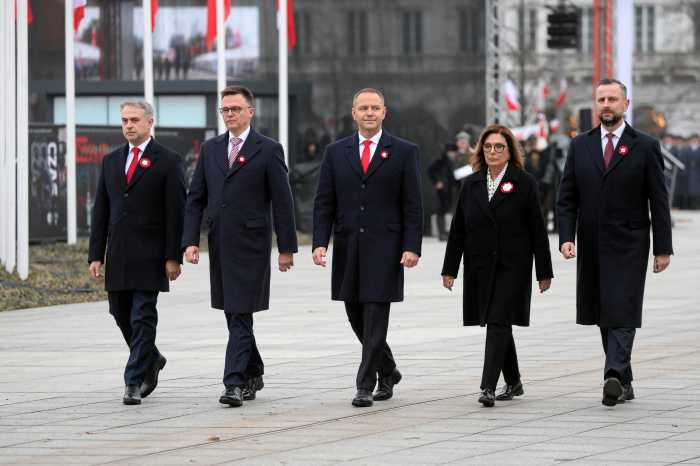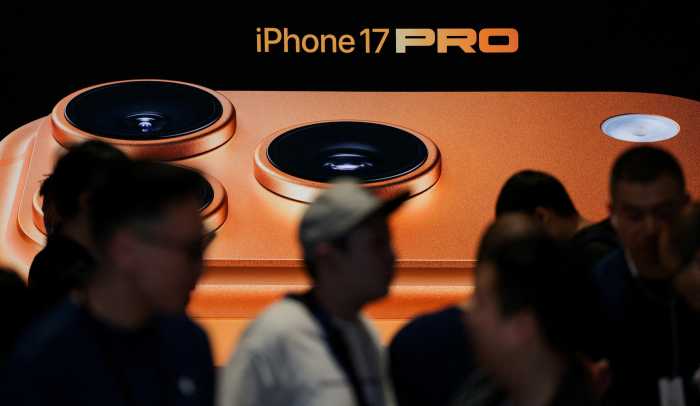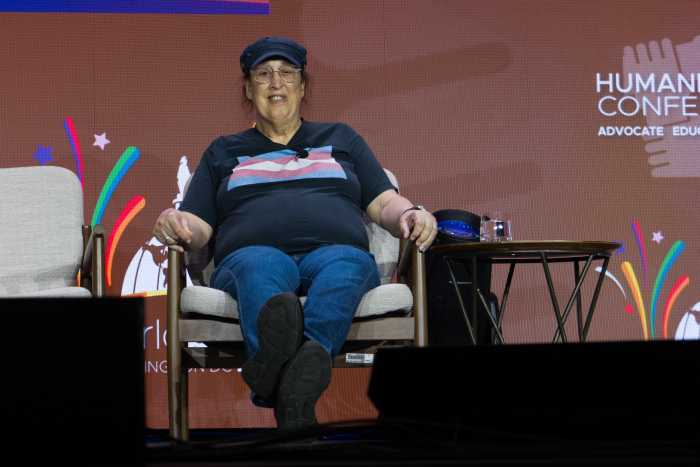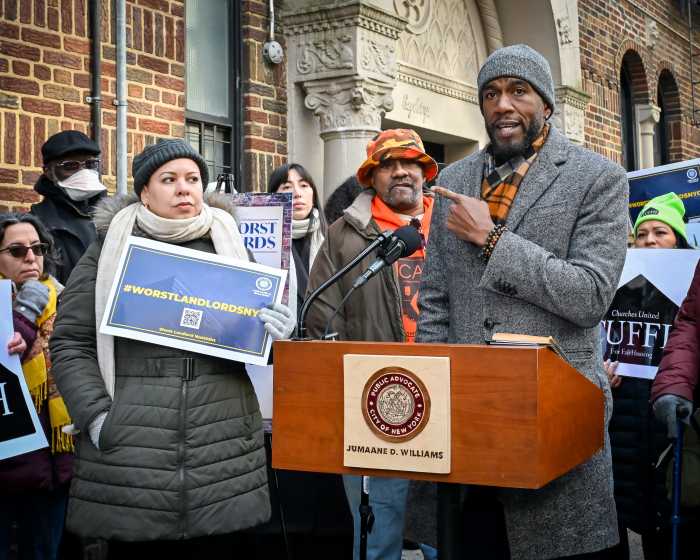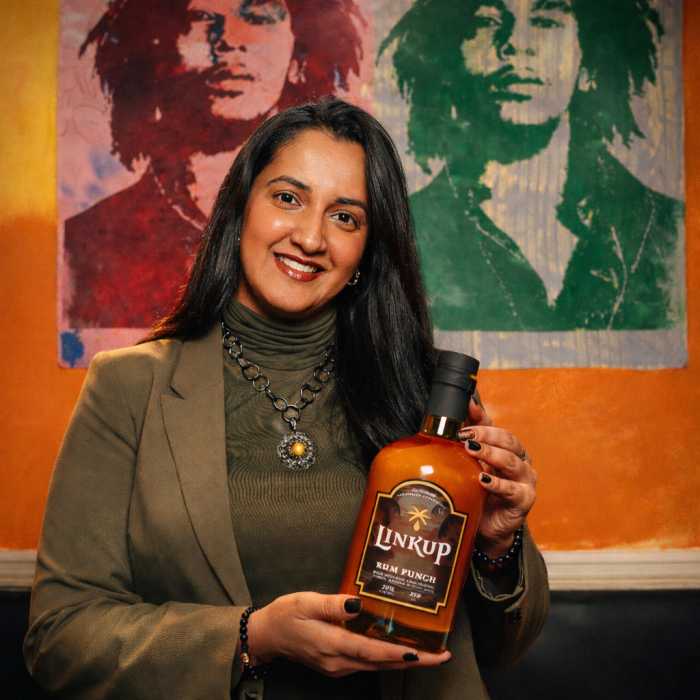Britain's best-known gay activist, Peter Tatchell, confronted Pakistan's Pervez Musharraf this past weekend when the dictator arrived in London on the last leg of his European tour.
BY DOUG IRELAND | Britain's best-known gay activist, Peter Tatchell, confronted Pakistan's Pervez Musharraf this past weekend when the dictator arrived in London on the last leg of his European tour, blocking the general's car with his body repeatedly to protest “the suppression of democracy and human rights” by the military strongman.
Tatchell, who this year marks the 40th anniversary of his start as an activist, undertook the protest against Musharraf even though he is still suffering the physical after-effects of the severe beating he received last year in Moscow when a crowd of fascist thugs, egged on by the police, violently broke up an attempted Gay Pride demonstration in front of Moscow's City Hall that Tatchell had gone to Russia to support (see this reporter's May 31-Jun. 5, 2007 article, “The Agony of Moscow Pride,” a link to which appears in the web version of this article).
“I've still got cognition and physical cordination problems, loss of vision, and memory holes” as a result of the Moscow beating, Tatchell, head of the militant UK queer rights group OutRage!, told Gay City News by telephone from London. He added, “First my doctors told me I'd be alright in a month, then they said three months, and now they're telling me these problems may never go away.”
The ambush of Musharraf happened outside London's Hilton Hotel Park Lane on January 25, as the Pakistani president's motorcade drew close to the hotel, where he was scheduled to speak.
“To avert police attention, I stood inconspicuously at a bus stop reading a newspaper, waiting for Musharraf's motorcade to arrive,” said Tatchell. “When the police motorcycle escorts drew level, I ran out into Park Lane and straight in front of the president's car. It screeched to a halt. I unfurled a placard protesting against Musharraf's massacre of civilians in occupied Baluchistan. The placard read: 'Stop Pakistan Massacre of Baluch people.'”
Tatchell got his message across to the Pakistani dictator.
“Musharraf could clearly see the placard, and he did not look pleased,” he said. “His driver tried to back up and drive around me, but I ran in front of the limousine again, forcing it to halt once more. I could see Musharraf shouting something at his driver. Perhaps he feared that I was an assassin or a suicide bomber.”
Then, said Tatchell, “The limo reversed again and tried to swerve past me. I blocked it for the third time. Musharraf and his colleagues looked very agitated. Eventually, police motorcycle escorts ran over and dragged me away from the bonnet of Musharraf's vehicle.”
Pulled across the road by police, Tatchell was pinned against a railing. He was soon released by police, allowing him to join the main anti-Musharraf demonstration outside the Hilton, organized by lawyers protesting the arrest of their colleagues and of Supreme Court judges in Pakistan.
This is not the first time Tatchell has personally confronted a dictator. He became a national hero in Britain when, on October 30, 1999, he and three other OutRage! activists ambushed Zimbabwe dictator Robert Mugabe's car in a London street and attempted to perform a citizen's arrest of him on charges of crimes in violation of United Nations human rights conventions. Tatchell opened the car door, seized Mugabe, and then summoned police. Mugabe was not taken into custody; instead all four OutRage! activists were arrested and Tatchell was charged with assault.
Mugabe is a ruthless tyrant who has used violence and imprisonment against political opponents. He is also a notorious anti-gay demagogue – he has said that gays and lesbians “are worse than pigs and dogs” – who criminalized homosexuality and authorized his political gangs to engage in street lynchings of gay Zimbabweans.
Tatchell tried again twice to perform a citizen's arrest on Mugabe – first in Belgium in 2001, when he was beaten unconscious by the dictator's bodyguards, causing him serious permanent damage to one eye; and then again in Paris in 2003, when Tatchell was arrested by the French police.
As The Independent, a British daily, noted in a recent profile of Tatchell, he “was once perhaps the most execrated man in British politics. He was – to restrict ourselves to quotations from just one newspaper, the Daily Mail – 'loony,' 'scabrous,' 'repellent,' 'repulsive,' 'sour,' 'humourless,' 'obnoxious,' and a 'homosexual terrorist'”
These epithets came after Tatchell led protests that disrupted church services led by the homophobic archbishop of Canterbury and threatened to out both Church of England bishops and conservative homosexual members of Parliament who voted against gay rights legislation.
But since his attempts to arrest Mugabe, “Tatchell has variously been called 'a national hero' (the Sunday Times), 'a civil rights campaigner we can all applaud' (Sunday Telegraph), and 'Heroic… an example to us all' (Daily Mail),” The Independent noted.
As Tatchell marked his fourth decade of militant human rights activism with the Musharraf protest, Gay City News asked prominent British gays to assess his contribution.
“Sometimes infuriating, often imbued with a great theatrically, Peter's work has helped keep moving forward the cause of gay emancipation enormously,” according to Joe Galliano, editor of Gay Times, the glossy monthly magazine that is the largest British gay publication. Galliano added, “Peter is one of the very few campaigners to make the intellectual leap that gay rights can only properly come through better respect of human rights for all.”
Brian Whitaker, author of “Unspeakable Love: Gay and Lesbian Life in the Middle East” and a senior editor at The Guardian, a British daily that regularly publishes Tatchell's commentaries on gay and human rights, told Gay City News, “Peter is a sort of one-man Great British Institution, even though he came from Australia – if he didn't exist he'd have to be invented.”
Whitaker went on to say, “I don't always agree with him and sometimes he goes a bit over the top, but he's courageous and absolutely sincere in what he does and many people admire him for that. One thing troubles me a bit – he's such an effective campaigner that other gay people tend to let him get on with it and don't become involved in activism themselves. They can send ten quid to OutRage!, then carry on partying with a clear conscience.”
The son of a lathe worker, Tatchell began his political activity when, as a Melbourne, Australia high school student in 1967, he organized a campaign on behalf of the indigenous Aboriginal population, who faced severe discrimination at the time. Although his fellow students recognized that he was gay, he proved popular with them. Tatchell was elected student body president, or “head boy.”
The next year, Tatchell joined the movement against Australia's involvement as a US ally in Viet Nam, and led campaigns urging other young men to refuse to be drafted. In August 1971 he emigrated to Britain to escape conscription. Five days after arriving in London, he attended a meeting of the recently organized Gay Liberation Front, and within a month he began organizing its campaigns.
In 1987, he was a founder of the UK AIDS Vigil pressure group and two years later started the London chapter of the AIDS Coalition To Unleash Power, or ACT UP. In May 1990, he attended the founding meeting of OutRage!, formed in response to police inaction after the queer-bashing murder of actor Michael Boothe. Gay journalists and writers Simon Watney, Keith Alcorn, and Chris Woods initiated the group to wage a provocative campaign of direct action and civil disobedience for gay rights. Tatchell in time became OutRage!'s leader.
“Peter Tatchell has been a huge and towering figure in British gay politics for the last quarter of a century,” Neil McKenna, an openly gay journalist and historian, told Gay City News from London.
McKenna, who authored the groundbreaking, critically acclaimed 2005 revisionist biography, “The Secret Life of Oscar Wilde,” which detailed the gay playwright's little-known work as a pioneer activist for homosexual emancipation, said, “Peter has worked selflessly to bring about change, making many memorable protests. He has lived on the poverty line for three decades and has to rely on a network of support to feed himself and clothe himself. He is unique, extraordinary, principled, dedicated, and should be classified as a living national treasure, warts and all.
“My first encounter with him was when I was a cub reporter attending a Church of England General Synod which was debating the rights and wrongs of homosexuality,” McKenna recalled. “Peter stood up in the public gallery circling the Synod and proceeded to denounce them. I wrote at the time that he stood up 'like an Old Testament prophet' and that image has stayed with me over the years. Peter Tatchell says things and does things which lots of people don't always want to hear.”
Tatchell has also been a pioneer in catalyzing international solidarity for oppressed LGBT people outside the West. In 1973, Tatchell was arrested in East Germany when he went there to help local activists stage what he says was the first public gay protest in a Communist country. In the 1980s, he traveled to Thailand to support the first wave of gay and AIDS activists in that country, and to El Salvador to highlight the violent attacks on that country's gays and lesbians amidst a bloody civil war, during which the US gave aid to the right-wing patrons of the authoritarian regime's death squads. He's traveled to Malawi to protest the semi-slave labor of children on British-owned tea estates; to New Guinea to protest the Indonesian massacre of indigenous peoples in West Papua; to Latvia for banned 2006 Gay Pride observances that were violently attacked by religious extremists (see this reporter's Jul. 27-Aug. 1, 2006 article “The Siege of Riga,” a link to which appears in the web version of this article); and to Memphis to confront boxer Mike Tyson after the pugilist gay-baited heavyweight boxing champion Lennox Lewis.
“I am often asked a question on who is my hero, whom I want to be like and I can answer for sure that Peter Tatchell is my hero, he is my ideal in fighting for LGBT rights in the world,” said Nicolai Alexeyev, the courageous young Russian lawyer who has been the principal organizer of Moscow Pride. And Alexeyev went on to say, “When I just started my activist work in Russia in 2005, it was Peter who was an inspiration to me. I tried to build our work here in Russia on the principles of his work in the UK. I think he is one of the most outstanding human rights and LGBT activits in the contemporary world, who is courageous and smart at the same time. I am extremely thankful to destiny that I got acquainted with Peter. He is a person of very high standing who is totally devoted to human rights and equality for everyone.”
One of Tatchell's most attention-getting protests came at the wedding of Prince Charles and Camilla Parker-Bowles, where he held up a sign that read, “Charles Can Marry Twice, Gays Can't Marry Once!”
Tatchell's flair for attracting media attention to his causes, which draws charges he's a publicity hound, includes writing a constant stream of articles for both the mainstream and gay press.
In 2002 he launched the Peter Tatchell Human Rights Fund to support his campaigning work around the world.
“Peter is a world leader when it comes to LGBT human rights activism,” UK Gay News editor Andy Harley told Gay City News, adding that “last year when he was seriously assaulted during Moscow Gay Pride, the first group who condemned the attack, and expressed support and good wishes for a speedy recovery, were exiled Ahwazi Arabs, a persecuted ethnic minority in Iran. They described Peter Tatchell as 'an icon in human rights.' This speaks volumes, coming from a Muslim group that has been supported by Peter.”
French black civil rights leader, scholar, and author Louis-Georges Tin, who is also the founder of the International Day Against Homophobia (IDAHO) – celebrated in over 50 countries last year – told Gay City News from Paris, “Peter Tatchell invented a new mode for gay activism, flamboyant and pragmatic at the same time, offensive and full of humor. As the apostle of this new genre of protests, he has sacrificed nearly everything – his private life, his material comfort, his physical security – to defend human rights in England and the entire world. When will he be awarded the Nobel Peace Prize he deserves?”
Ex-pat British author Christopher Hitchens, a Vanity Fair columnist, told this reporter, “Peter Tatchell has made an exemplary effort, in his life and in his writing, to give expression to a consistent and international ethic of human rights and human dignity.”
And Sir Elton John recently said of Tatchell, “He's incredibly brave… doing good work in a world where most people are too timid. He keeps sticking at it.”
Peter, we salute you!
Doug Ireland can be reached through his blog, DIRELAND, at http://direland.typepad.com/direland/. For more on Peter Tatchell, his campaigns, and his writing, visit his web site at http://www.petertatchell.net/.

